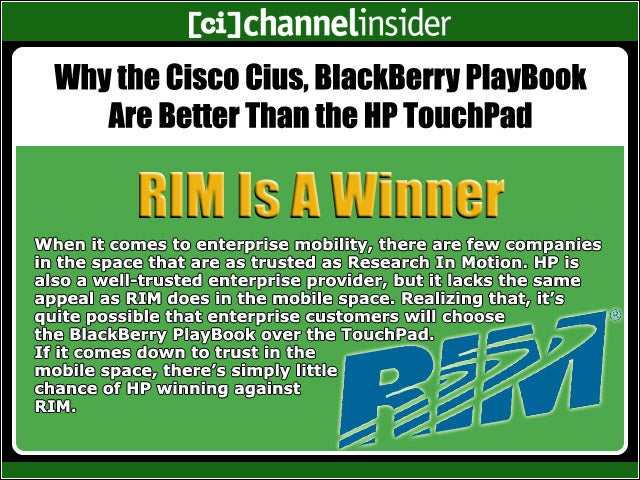 RIM Is A Winner
RIM Is A Winner
When it comes to enterprise mobility, there are few companies in the space that are as trusted as Research In Motion. HP is also a well-trusted enterprise provider, but it lacks the same appeal as RIM does in the mobile space. Realizing that, it’s quite possible that enterprise customers will choose the BlackBerry PlayBook over the TouchPad. If it comes down to trust in the mobile space, there’s simply little chance of HP winning against RIM.
 Cisco Is Working With Android
Cisco Is Working With Android
WebOS is running in the HP TouchPad. What that means for companies is that they could potentially be using a platform that they might or might not know much about. But Cisco’s Cius is running Android, an operating system that hasn’t been very well adopted in the enterprise, but is well known among companies. That’s an important element in enterprise adoption. And it could be enough for companies to give the Cius a nod over the TouchPad.
 The Apps Might Be An Issue
The Apps Might Be An Issue
On its Web site detailing TouchPad features, HP says that the tablet will have “thousands of apps” available to users. And that will undoubtedly be the case. But for enterprise users, the important number is how many apps designed with corporate customers in mind. That’s one area where the TouchPad, which is geared towards consumers mostly, could fall short. But the Cius and BlackBerry PlayBook won’t—developers know that those tablets will perform most effectively in the enterprise.
 WebOS Hasn’t Been So Appealing
WebOS Hasn’t Been So Appealing
It’s important to remember that WebOS has been around for quite some time. And it’s perhaps just as important to remember that the operating system hasn’t been as popular among enterprise customers as it could have been over the years. RIM’s BlackBerry operating system, on the other hand, has been appealing. And although RIM will be offering a new OS, its history could be enough for enterprise customers to opt for the BlackBerry PlayBook over the TouchPad.
 RIM’s BlackBerry Enterprise Server Integration
RIM’s BlackBerry Enterprise Server Integration
One of the key reasons RIM has been such a success is its BlackBerry Enterprise Server. That solution allows IT administrators to have more control over data. And it usually makes mobile workers more productive. In an extremely smart move, RIM is bringing BlackBerry Enterprise Server integration to the BlackBerry PlayBook. That should make enterprise customers happy, and it could make them think twice about the TouchPad.
 Cisco Is Viewed As Reliable
Cisco Is Viewed As Reliable
Cisco, like HP, doesn’t have the same appeal in the mobile space that RIM does. Part of that is simply because the company hasn’t competed enough in that market. But Cisco, like HP, is viewed as a reliable company by enterprise customers. And when that’s combined with an arguably more appealing tablet for enterprise users, it’s not a stretch to say that the Cius could have better sales in the enterprise than the TouchPad.
 They’ve Made It Clear They’re Not the iPad
They’ve Made It Clear They’re Not the iPad
One of the biggest mistakes that HP made when it was talking about its TouchPad on Feb. 9 is that it didn’t make it clear to enterprise customers that it didn’t want its tablet to be another iPad. Apple’s tablet has been seeing slow, but steady growth in the enterprise, but it’s still not trusted by far too many companies. If HP could make the case that it doesn’t want to be like the iPad, it might have been able to appeal to more enterprise customers that are still on the fence with Apple’s tablet.
 It’s Not A Consumer’s Game
It’s Not A Consumer’s Game
One of the biggest issues affecting the iPad’s adoption in the enterprise is that it’s viewed by some IT decision-makers as a consumer-focused product. Many would agree with that sentiment. But those who would agree would also quickly realize that the TouchPad is also a consumer-focused product. And that alone could be enough to see its sales derailed against the Cisco Cius and the RIM BlackBerry PlayBook—two devices designed with corporate customers in mind.
 Where’s the Differentiation?
Where’s the Differentiation?
When it’s all said and done, HP needs to deliver differentiation in order to appeal to corporate customers. But with a 9.7-inch display, the same basic design as the iPad, and many of the same features, it’s not all that different. The biggest difference between the two platforms is HP’s operating system choice. But as mentioned, WebOS is an unknown to enterprise customers right now, and it could prove to be a liability in the enterprise.
 The Key 3G Consideration
The Key 3G Consideration
When the HP TouchPad launches this summer, the device won’t come with 3G connectivity built-in. The company said that a 3G-capable version of the device won’t be available until after the summer. That’s a problem for enterprise customers. They expect their employees to be mobile and productive while they’re on-the-go. If 3G isn’t included in the tablet, they can’t achieve that with the TouchPad, which makes all the less appealing to enterprise users.

